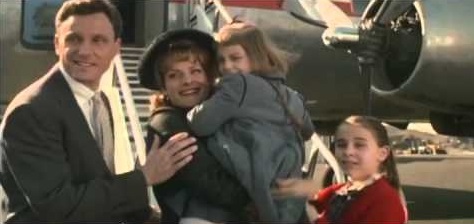Movie Info
Movie Info
- Director
- Eva Gardos
- Run Time
- 1 hour and 46 minutes
- Rating
- PG-13
VP Content Ratings
- Violence
- 2/10
- Language
- 1/10
- Sex & Nudity
- 1/10
- Star Rating
Relevant Quotes
From now on, therefore, we regard no one from a human point of view; even though we once knew Christ from a human point of view, we know him no longer in that way. So if anyone is in Christ, there is a new creation: everything old has passed away; see, everything has become new! All this is from God, who reconciled us to himself through Christ, and has given us the ministry of reconciliation; that is, in Christ God was reconciling the world to himself not counting their trespasses against them, and entrusting the message of reconciliation to us.

Written and directed by Eva Gardos, this film is based on the filmmaker’s own experience as a young immigrant brought from a country that was basically a Communist prison camp to a land of almost unbridled freedom. It turns out to be a mother-daughter story wherein each has much to learn about relationships.
The film begins (in black & white) with Peter (Tony Goldwyn), a publisher of fine books, and his wife Margit (Nastassja Kinski) hurriedly preparing to flee Hungary during the early Fifties when the country was suffering from Stalin’s harsh tyranny. They have two daughters, Sheila and the infant Suzanne, but learn at the last minute that the smuggler will not allow any babies because of the extreme danger. Against Margit’s protests, Peter gives Suzanne over into the care of the wealthy grandmother Helen (Agi Banfalvy).
The perceived danger of their flight is borne out by the suspenseful night-time crossing the family endures, led by a nervous smuggler. As a searchlight from a guard tower sweeps across the area, the four have to crawl through a barbed wire fence, avoid the deadly mines planted haphazardly in the no man’s land, and cut and crawl their way through a second barbed wire fence. Close by a pair of armd guards patrol with a vicious looking dog.
While the family is making its way to freedom in the West, Helen is being arrested and sent to prison. She had anticipated trouble, so she had arrangd for Suzanne to be taken to the country where the middle aged peasant couple Teri (Zsuzsa Czinkoczi) and Jeno (Balazs Galko) were happy to take her in, not having a child of their own.
Although hard up economically, the pair were rich in love, Teri sewing the child’s dresses and Jeno often enfolding the infant in his arms. They know this will come to an end, but they allow the child, when she grows old enough to speak, to call them mama and poppa.
In Los Angeles Peter has to deal with Margit’s guilt and strong resentment at having to leave their baby behind. He manages to find work as a mechanic in an airplane factory and selling vacuum cleaners on the side, though he still harbors the hope that he can publish books again. Margit, sometimes neglecting Sheila out of concern for Suzanne, becomes the stylishly dressed housewife dedicated to keeping their middleclass suburban home clean and orderly. She frequently looks at pictures of Suzanne and asks when they can obtain permission to bring her to America. Slowly she accepts the friendship of the two neighbor wives who visit her with a welcoming plate of food. Sheila grows to be a typical American teenager with a circle of friends plus a boyfriend.
When Suzanne (Kelly Endrész Banlaki) is about to be enrolled in school, the Hungarian couple celebrate her birthday. Teri’s gift to her is a scratched wooden box with a treasure given her by her own mother, a miniature china tea set. Jeno’s is a used bicycle which he invites her to join him in painting a bright red. Before they can finish it, the girl’s grandmother Helen shows up, having been released from prison when the death of Stalin allows more liberal policies to spread through the Soviet empire.
Helen takes the girl on what they all think is a day trip to Budapest, but in reality Margit and Peter have made arrangements through her to send Suzanne to America. The little girl is perplexed about her new, more luxurious living conditions, still referring to her foster parents as “Moma and Papa” and their village as “home.” Her mother buys her smart little dresses, but the girl insists on wearing pants.
Several times she wanders from her new house. Her older sister Sheila with her circle of friends are not much company. During one of the times that she runs away to a park, her father comes up to her. He offers her a “deal,” that if she tries to get along, then later if she wants to return to Hungary, he will buy her a ticket. They shake on this. Her child’s face dissolves to her teenage face. Years have passed, and relations with her mother have grown very strained as Margit tries to protect her now teenaged daughter (now played by Scarlett Johansson). The girl still insists always on wearing pants, though now well tailored.
Suzanne has acquired a boyfriend named Paul, which adds to the worries of Margit. A typical mother and daughter argument ends with neither giving way, as we see in the following exchange: Margit: “Do you know what your father and I had to go through…” Suzanne : “Yeah, I know, you- you walked 20 kilometers and you- you climbed under barbed wire, right? Yeah, I know.” Margit: “You don’t know anything.” Margit becomes so frustrated with her daughter sneaking out at night to join her boyfriend that she hires a man to install bars on the bedroom window and a lock on the door. Suzanne is furious over this, convinced her mother is being unreasonably controlling.
When she is fifteen and thoroughly estranged from her mother, Suzanne insists that she be allowed to return to Hungary for a visit with Teri and Jeno and her grandmother. Peter wins the argument over this with Margit, and their daughter reunites with her foster parents. Her time spent in the country strengthens her love for the pair, but she also sees the hardships of a people living under Communist tyranny. Visiting her grandmother Helen, she is surprised that the government could have siezed her mansion and given it to an official. Even more, she is shaken by her grandmother’s traumatic story involving the fate of her husband, Margit’s father and Suzanne’s grandfather—a shocking tragedy that unfolded right before their eyes in a restaurant where Russian soldiers also were dining and drinking. This transforms the girl’s attitude toward her controlling mother and thus their future relationship.
When Suzanne gets off the plane in Los Angeles she has traded her slacks for a skirt. In a beautifully staged scene she approaches the fence where her mother awaits her. Asked why she never told her about the tragedy, Margit replies that she wanted to put everything in the past. They continue to converse warmly, Margit telling her that she was right in taking the trip, that she is a brave girl. They come to the end of the chain-link barrier, wonderfully symbolizing the end of their estrangement and the beginning of a new phase in their relationship. “Hi Mom,” Suzanne says. They are then joined by Sheila and Peter, warmly embracing.
The film is available on Amazon Prime and also on YouTube.
This review will be in the August issue of VP along with a set of questions for reflection and/or discussion. If you have found reviews on this site helpful, please consider purchasing a subscription or individual issue in The Store.

